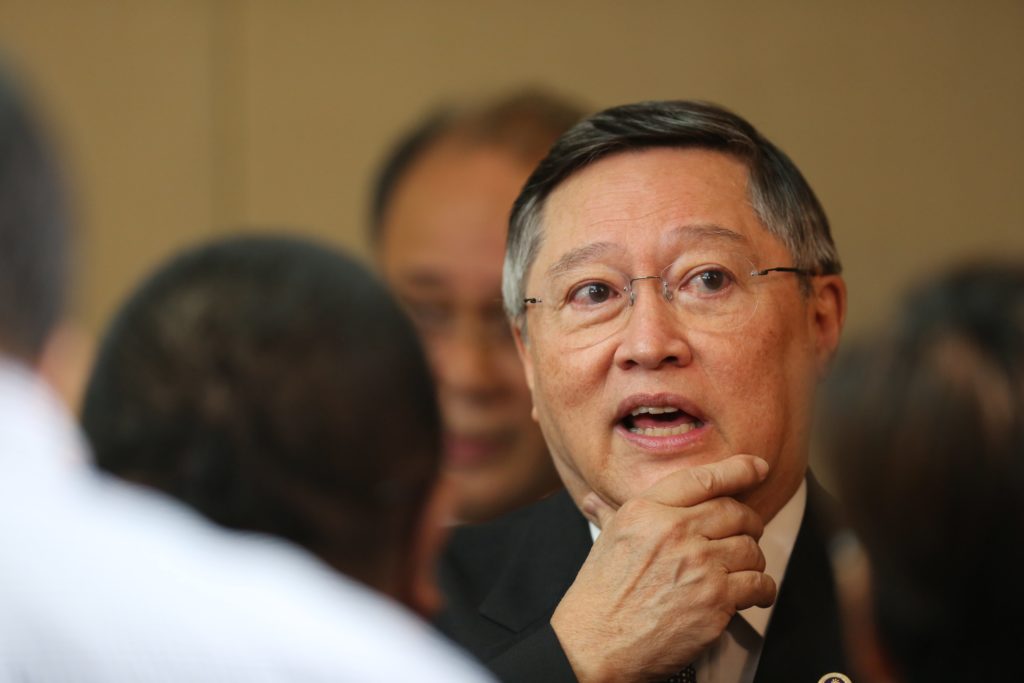DOF expects credit rating upgrades; Moody’s lauds tax reform OK

Finance Secretary Carlos G. Dominguez III (Presidential Photographers Division)
MANILA — Finance Secretary Carlos G. Dominguez III said the Philippines remained underrated by credit ratings agencies while Moody’s Investors Service on Monday tagged as credit positive the passage of the first tax reform package in the Lower House.
“We hope that an upgrade will follow. It’s very important for us. That means to say we will pay less interest, and that will translate to relatively low interest rates for everybody in the country… So I think it’s really beneficial, that’s why we’re working hard towards it,” Dominguez told reporters late Friday.
Asked if he thought the country has been underrated despite enjoying investment grade status, Dominguez replied: “I think we are underrated; you cannot say we are overrated.”
“I have evidence of that: when we floated our [global bonds last January], the spread between the US and us was only 67 basis points. In the previous year, it was 105 basis points, so obviously our rating in the eyes of the lenders, not the rating agencies, has improved relative to that of the US. Of course then I will say, the rating agencies have underrated us,” Dominguez explained.
In a statement Monday, debt watcher Moody’s said last week’s passage of House Bill No. 5636 or the Duterte administration’s Tax Reform for Acceleration and Inclusion (Train) was “credit positive because it
will address the Philippines’ weak revenue generation.”
“The Train bill, which awaits approval by the Senate, is also crucial to maintaining narrow fiscal deficits since the administration of President Rodrigo Duterte intends to ramp up infrastructure spending over the course of its term in government through 2022. The passage of the tax reform also demonstrates the capacity to implement reform amid the political controversies around the government’s focus on security and the war on drugs,” said Christian de Guzman, vice president and senior credit officer at Moody’s sovereign risk group.
“The Train bill will boost revenue and improve the government’s debt affordability, as measured by interest payments as a share of revenue,” De Guzman added, citing that while government revenues have
been increasing during the last six years such that the revenue-to-gross domestic product (GDP) ratio rose to 15.2 percent in 2016 from 13.4 percent in 2010, actual collections remained relatively less than most of its peers that have a credit rating of Baa.
In light of its revenue-enhancing measures, “the Train bill will also help to keep fiscal deficits in check as the government’s plans to increase expenditures gradually to 20 percent of GDP by 2020 from the budgeted target of 18.3 percent this year,” De Guzman said.
Also, “against the backdrop of political controversy, the passage of the tax bill also demonstrates the government’s capacity to implement reform,” De Guzman pointed out.
“Since last year, Mr. Duterte’s administration has been mired in various controversies related to his focus on security and the war on drugs. As a result, strained relations with some factions in both houses of Congress threatened to detract attention away from the reform agenda, particularly those related to economic and fiscal matters. Nevertheless, Mr. Duterte has maintained high approval ratings among the electorate, as well as a coalition comprising a strong majority in the House of Representatives, and has leveraged his political capital to push the Train bill through the legislature,” according to De Guzman. SFM